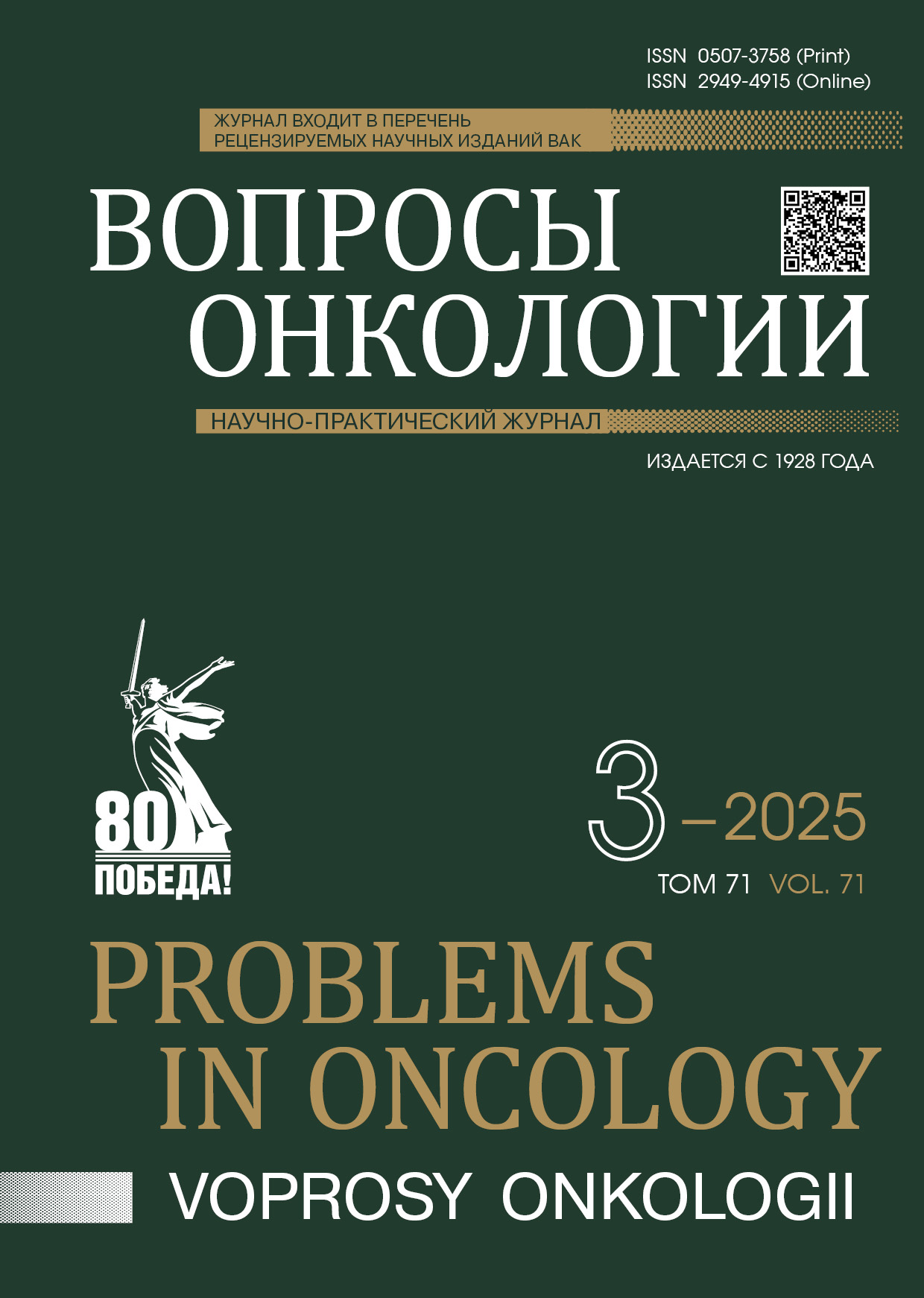Abstract
Aim. To evaluate the efficacy and safety of ultrahypofractionated postoperative irradiation of remaining breast tissue following breast-conserving surgery.
Materials and methods. A comparative analysis of moderate- and ultra-hypofractionated postoperative irradiationy for early-stage breast cancer was performed on 194 patients. For 90 women, the treatment consisted of five daily fractions of 5/2 Gy each, to a total dose of 26 Gy. In 104 women, postoperative irradiation consisted of 16 daily fractions of 2.66 Gy, to a total dose of 42.56 Gy, followed by additional irradiation of the tumor bed, with a total dose of 10–16 Gy. The frequency of local recurrences was calculated using the Kaplan–Meier method. Data from dynamic observation and the results of telephone surveys of the patients included in the study were analyzed to evaluate cosmetic outcomes using the Russian version of the BREAST-Q™ - Version 2.0 questionnaire.
Results. Local control was achieved for five years in 97.8% of patients after ultrahypofractionated radiotherapy and in 96.2% after moderate hypofractionation (p = 0.259). Analysis of cosmetic outcomes revealed a significant difference in the frequency of skin hyperpigmentation. It was observed in 30 patients (33.3%) in the extreme hypofractionation group, compared to 18 patients (17.3% of cases) who received moderately hypofractionated irradiation (p = 0.01). There was no significant difference in the frequency or severity of other 'cosmetic' indicators, such as telangiectasia severity, skin dryness and irritation, pain intensity and skin edema, between the two groups.
Conclusion. The comparative analysis indicates that moderate and extreme hypofractionation regimens are equally effective and safe for the postoperative irradiation of residual breast tissue, and they may be considered for inclusion in clinical guidelines.
References
Fisher B., Anderson S., Bryant J., et al. Twenty-year follow-up of a randomized trial comparing total mastectomy, lumpectomy, and lumpectomy plus irradiation for the treatment of invasive breast cancer. N Engl J Med. 2002; 347(16): 1233-1241.-DOI: 10.1056/NEJMoa022152.
Veronesi U., Cascinelli N., Mariani L., et al. Twenty-year follow-up of a randomized study comparing breast-conserving surgery with radical mastectomy for early breast cancer. N Engl J Med. 2002; 347(16): 1227-1232.-DOI: 10.1056/NEJMoa020989.
Yarnold J., Ashton A., Bliss J., et al. Fractionation sensitivity and dose response of late adverse effects in the breast after radiotherapy for early breast cancer: long-term results of a randomised trial. Radiother Oncol. 2005; 75(1): 9-17.-DOI: 10.1016/j.radonc.2005.01.005.
Owen J.R., Ashton A., Bliss J.M., et al. Effect of radiotherapy fraction size on tumour control in patients with early-stage breast cancer after local tumour excision: long-term results of a randomised trial [published correction appears in Lancet Oncol. 2006; 7(8): 620]. Lancet Oncol. 2006; 7(6): 467-471.-DOI: 10.1016/S1470-2045(06)70699-4.
Whelan T.J., Pignol J.P., Levine M.N., et al. Long-term results of hypofractionated radiation therapy for breast cancer. N Engl J Med. 2010; 362(6): 513-520.-DOI: 10.1056/NEJMoa0906260.
Haviland J.S., Owen J.R., Dewar J.A., et al. The UK Standardisation of Breast Radiotherapy (START) trials of radiotherapy hypofractionation for treatment of early breast cancer: 10-year follow-up results of two randomised controlled trials. Lancet Oncol. 2013; 14(11): 1086-1094.-DOI: 10.1016/S1470-2045(13)70386-3.
Тимошкина Е.В., Ткачев С.И., Глебовская В.В., et al. Влияние гипофракционного режима адъювантной лучевой терапии на частоту осложнений у больных раком молочной железы с одномоментной реконструкцией синтетическими материалами. Медицинский алфавит. 2023; (10): 18-24.-DOI: 10.33667/2078‑5631‑2023‑10‑18‑24. [Timoshkina E.V., Tkachev S.I., Glebovskaya V.V., et al. Impact of hypofractionated adjuvant radiotherapy on complication rate in breast cancer patients with implant-based immediate reconstruction. Medical alphabet. 2023; (10): 18-24.-DOI: 10.33667/2078-5631-2023-10-18-24 (In Rus)].
Брянцева Ж.В., Новиков С.Н., Ульрих Д.Г., et al. Влияние режима фракционирования дозы адъювантной лучевой терапии на косметические результаты у больных раком молочной железы после реконструктивно-пластических операций с одномоментной установкой эндопротеза. Сибирский онкологический журнал. 2024; 23(6): 22-31.-DOI: 10.21294/1814-4861-2024-23-6-22-31. [Bryantseva Zh.V., Novikov S.N., Ulrikh D.G., et al. Impact of dose fractionation regimen of adjuvant radiotherapy on cosmetic outcomes after immediate breast reconstruction. Siberian journal of oncology. 2024; 23(6): 22-31.-DOI: 10.21294/1814-4861-2024-23-6-22-31 (In Rus)].
START Trialists' Group, Bentzen S.M., Agrawal R.K., et al. The UK Standardisation of Breast Radiotherapy (START) Trial B of radiotherapy hypofractionation for treatment of early breast cancer: a randomised trial. Lancet. 2008; 371(9618): 1098-1107.-DOI: 10.1016/S0140-6736(08)60348-7.
Brunt A.M., Haviland J.S., Sydenham M., et al. Ten-year results of FAST: A randomized controlled trial of 5-fraction whole-breast radiotherapy for early breast cancer. J Clin Oncol. 2020; 38(28): 3261-3272.-DOI: 10.1200/JCO.19.02750.
Brunt A.M., Haviland J.S., Wheatley D.A., et al. Hypofractionated breast radiotherapy for 1 week versus 3 weeks (FAST-Forward): 5-year efficacy and late normal tissue effects results from a multicentre, non-inferiority, randomised, phase 3 trial. Lancet. 2020; 395(10237): 1613-1626.-DOI: 10.1016/S0140-6736(20)30932-6.
Brunt A.M., Haviland J.S., Wheatley D.A., et al. One versus three weeks hypofractionated whole breast radiotherapy for early breast cancer treatment: the FAST-Forward phase III RCT. Health Technol Assess. 2023; 27(25): 1-176.-DOI: 10.3310/WWBF1044.
Lanni T., Keisch M., Shah C., et al. A cost comparison analysis of adjuvant radiation therapy techniques after breast-conserving surgery. Breast J. 2013; 19(2): 162-167.-DOI: 10.1111/tbj.12075.
Jagsi R., Griffith K.A., Moran J.M., et al. A randomized comparison of radiation therapy techniques in the management of node-positive breast cancer: primary outcomes analysis. Int J Radiat Oncol Biol Phys. 2018; 101(5): 1149-1158.-DOI: 10.1016/j.ijrobp.2018.04.075.

This work is licensed under a Creative Commons Attribution-NonCommercial-NoDerivatives 4.0 International License.
© АННМО «Вопросы онкологии», Copyright (c) 2025

